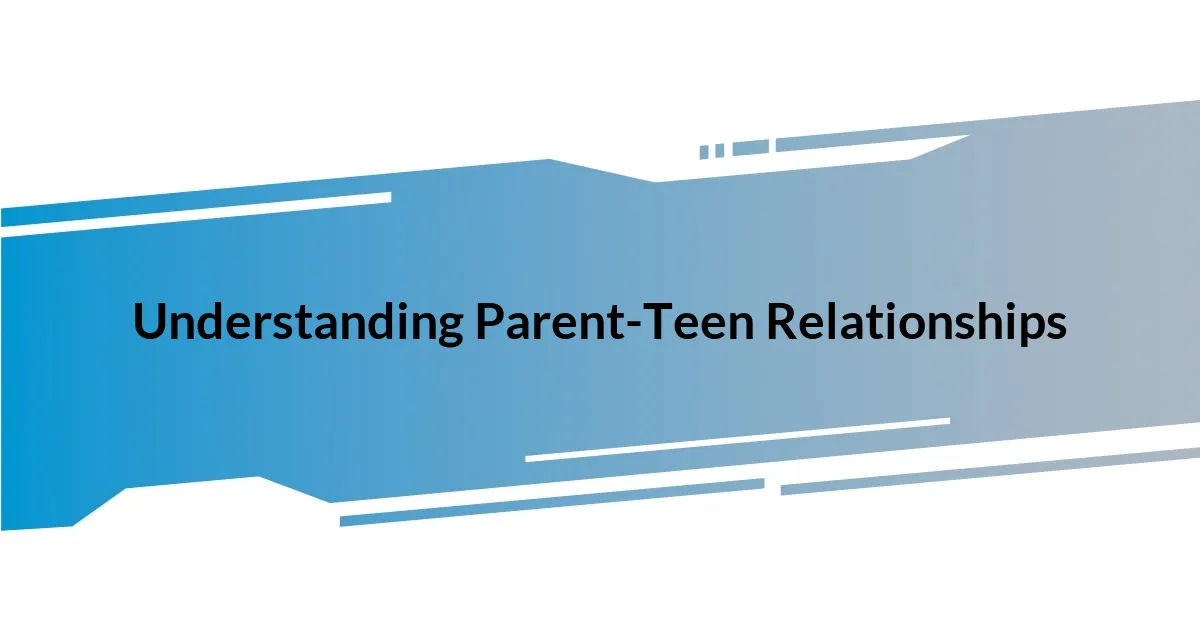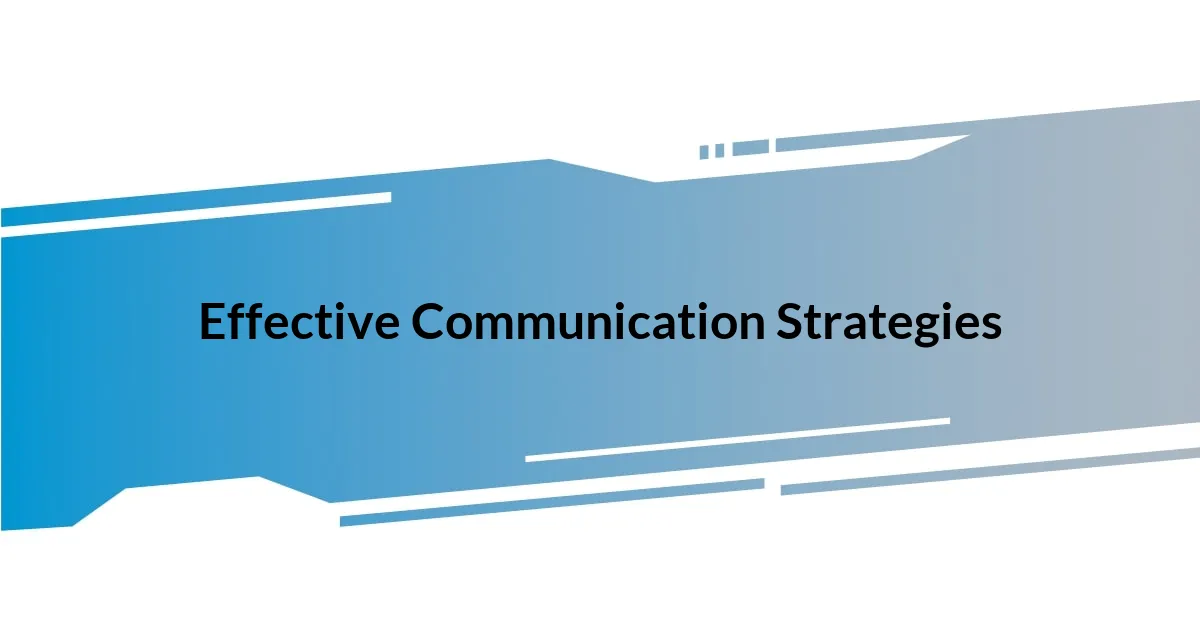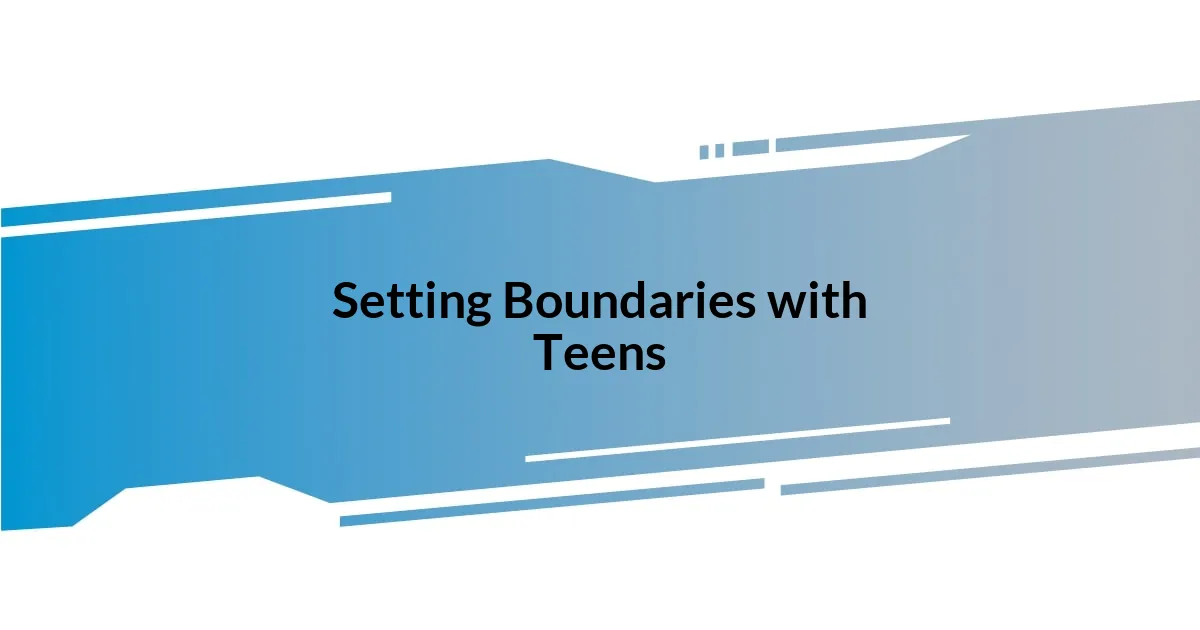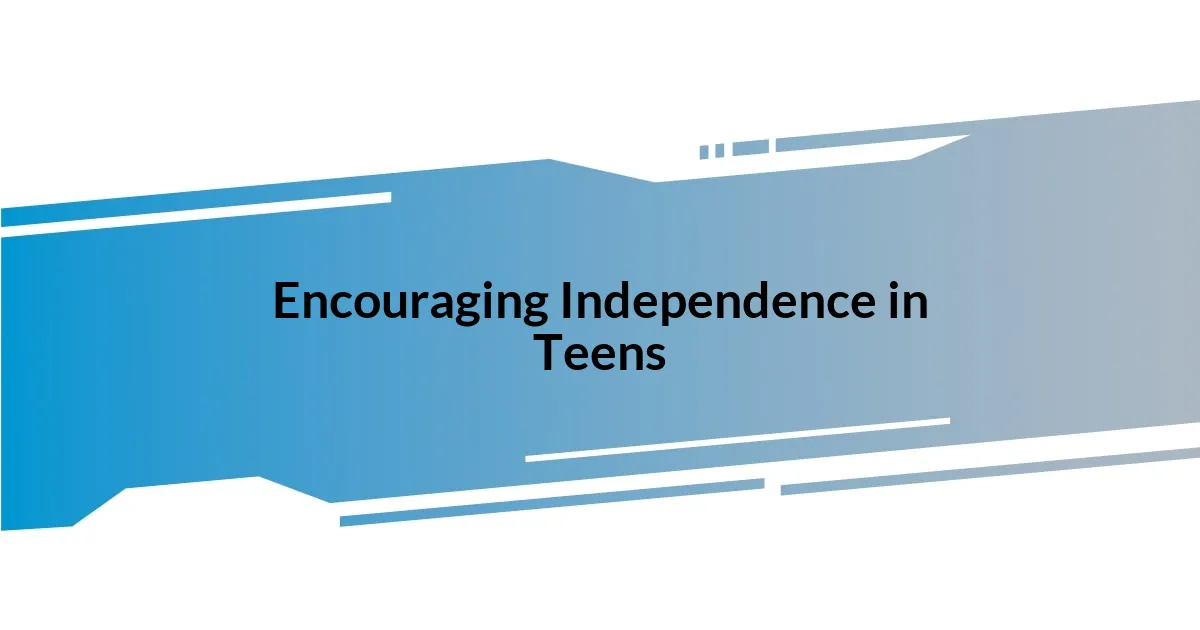Key takeaways:
- Open communication and active listening are essential for fostering understanding in parent-teen relationships.
- Setting boundaries collaboratively with clear expectations promotes mutual respect and accountability.
- Encouraging independence helps teens develop confidence and critical thinking skills, while celebrating their choices validates their emotions.
- Creating a supportive environment for academic success and being an empathetic listener during emotional challenges is crucial for teens’ well-being.

Understanding Parent-Teen Relationships
Understanding parent-teen relationships can often feel like navigating a rollercoaster. I remember a time when my teenager slammed their door after a disagreement. In that moment, I felt a mix of frustration and worry. Am I really doing this right? It’s crucial to recognize that these emotional outbursts are often part of the developmental process.
As teens strive for independence, they push boundaries, testing their limits and, in turn, ours. This is when I learned the importance of open communication. When we sit down eye to eye, sharing our feelings without judgment, it transforms those tense moments into opportunities for connection. Have you noticed how a simple heart-to-heart can shift the entire atmosphere in your home?
Noticing my teenager’s changing moods felt overwhelming at times, but I realized they were trying to express themselves. If I approached these moments with empathy, asking questions like, “What’s bothering you?” it opened the door for deeper understanding. Isn’t it fascinating how a little patience can lead to genuine connection? Ultimately, developing this understanding is a continuous journey that requires both parents and teens to put in the effort.

Effective Communication Strategies
When it comes to effective communication with teenagers, one of the most powerful tools I’ve found is the art of active listening. For instance, there was an evening when my teen opened up about feeling pressured at school. Instead of jumping in with my advice, I paused and really listened, nodding along and refraining from interrupting. This not only made them feel respected but also encouraged them to share more. How often do we truly listen without thinking about our response?
Another strategy I’ve embraced is using “I” statements instead of “you” statements. In the past, when I reacted to my teen’s choices, it often felt accusatory. I remember saying, “You never listen to me!” only to realize that it triggered defensiveness rather than dialogue. Switching to “I feel worried when I don’t hear from you” opened a softer line of communication. It’s amazing how framing things from my perspective can invite understanding rather than conflict.
Moreover, humor has become an unexpected ally in our communication. There are times when my teen and I might find ourselves in a heated debate about curfews. Instead of escalating tension, I recall one particular night when I decided to crack a joke about my own late-night escapades from my teens. Laughter instantly lightened the mood, diffusing the situation. Have you found humor to be effective in your conversations with your teens? It’s a reminder that while the topics may be serious, the conversation doesn’t always have to be.
| Communication Strategy | Description |
|---|---|
| Active Listening | Fully focusing on what your teen is saying without planning your response while they speak. |
| I-Statements | Framing concerns from your perspective to promote understanding rather than defensiveness. |
| Humor | Using light-hearted remarks to ease tension and promote open dialogue. |

Setting Boundaries with Teens
Setting boundaries with teens can indeed be challenging, yet it’s essential for nurturing their growth. I recall a pivotal moment when my teenager wanted to go out on a school night with friends, which sparked a debate. Instead of sticking with a flat-out “no,” I explained my reasoning about early mornings and the importance of rest. This dialogue revealed just how much they appreciated understanding the ‘why’ behind my boundaries. Seeing them grasp not just the rules but the rationale behind them made me realize that boundaries are more effective when they’re built on mutual respect.
Establishing clear expectations is crucial, and sometimes a collaborative approach works wonders. I found that involving my teen in creating house rules fosters accountability. Here’s what I learned about effective boundaries:
-
Clarity: Clearly communicate your expectations. It’s helpful to define what is acceptable and what isn’t.
-
Involvement: Involve your teen in the decision-making process to increase their buy-in. When they’re part of the discussion, it feels less like a mandate.
-
Consistency: Stick to the boundaries you set. Inconsistent reactions can confuse them, leading to more boundary-testing.
-
Flexibility: Allow for negotiations on certain rules to help them feel more in control and respected while still maintaining overall guidelines.
-
Understanding: Always explain the reasons behind boundaries to promote understanding and help them see your perspective. This not only builds trust but can also show them how to set their own limits in the future.

Encouraging Independence in Teens
Encouraging independence in teens is a balancing act that I’ve found necessary for their growth. I remember when my daughter first wanted to manage her own schedule for schoolwork and extracurriculars; I was taken aback. At first, I hesitated, thinking I needed to guide her to ensure she didn’t overcommit. But then I decided to let her take the reins, asking her to outline her priorities and share her reasoning. I quickly realized that empowering her to make decisions, even if she stumbled occasionally, built her confidence and taught her invaluable organizational skills.
When my son expressed a desire to bicycle to his friend’s house alone for the first time, a wave of protective instinct kicked in. Instead of just saying “no,” I asked him what he thought might be the challenges he could face on the ride. This conversation allowed not only a healthy discussion about safety but also provided him an opportunity to problem-solve. As he laid out his thoughts, I felt a sense of pride knowing I was nurturing his ability to think critically. Have you ever felt your heart race while watching your child take a leap of independence? It’s exhilarating to witness them learn how to navigate the world around them.
As I reflect on these experiences, I’ve come to appreciate the importance of teaching self-advocacy. There was a time when my teen felt overwhelmed with choices for summer activities, and instead of advising her what to pick, I encouraged her to list out what she enjoyed most. When she came back excited about a summer internship she found on her own, her joy was palpable. That moment taught me that supporting their independence means celebrating their choices—good or bad—and validating their emotions throughout the process. How do you celebrate your teen’s independent choices?

Supporting Academic Success
Supporting academic success in teens is crucial, and I’ve learned that fostering a supportive environment can make all the difference. One time, my son was struggling with a math project that seemed insurmountable to him. Instead of jumping in to solve it, I sat down next to him, offering to brainstorm ideas together. That collaborative moment not only made the task lighter but also allowed him to see that asking for help is okay—a valuable lesson in both academics and life.
I’ve also discovered that creating a dedicated study space at home can significantly impact their focus. Just recently, we transformed a corner of the living room into his personal study nook. Adding a few motivational posters and ensuring it was free of distractions encouraged him to take ownership of his study time. Have you seen how environment shapes study habits? It’s fascinating how a simple setup can ignite their desire to hit the books.
Moreover, maintaining open lines of communication about academic pressures is essential. I remember a night when my daughter came home overwhelmed after a tough day at school. Instead of offering solutions right away, I just listened. Through that conversation, I learned that sometimes, being a sounding board is more important than dispensing advice. How do you approach conversations about school stresses? Emphasizing empathy in those moments helped her feel understood, and ultimately, empowered to navigate her challenges.

Navigating Emotional Challenges
Navigating emotional challenges with teens is a journey filled with highs and lows. I vividly recall one evening when my daughter stormed into her room after a disagreement with a friend. Rather than giving her space, I gently knocked and asked if she wanted to chat about it. To my surprise, she opened up about feeling betrayed, and just listening made her emotional burden a bit lighter. Have you found that sometimes your presence can be incredibly reassuring during their turbulent moments?
Understanding emotional fluctuations is also vital. There are days when my son seems on top of the world, and others when a cloud of sadness seems to loom over him. I learned that recognizing these patterns is crucial. By validating his feelings instead of brushing them aside, I foster a safe space for him to express himself. The key is to ask open-ended questions like, “What’s been on your mind lately?”—a simple nudge that often leads to meaningful conversations. How do you approach your teen’s emotional landscape?
One powerful moment for me was when my daughter struggled with anxiety before a big presentation. Instead of dismissing her fears, I shared my own experiences with public speaking, including a time I had flubbed a presentation early in my career. This connection deepened our bond and made it clear that everyone has their challenges. I’ve found that offering personal stories can spark hope and show them they’re not alone in their struggles. Have you ever shared your own vulnerabilities to help your child navigate theirs? It can transform the way they view their own emotional hurdles.